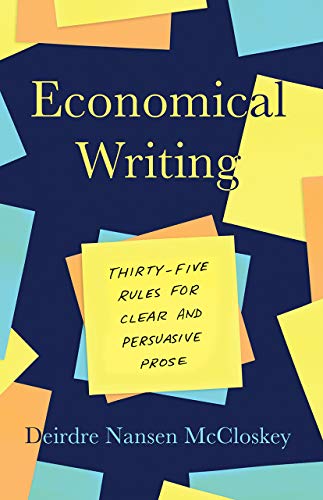Economical Writing, Third Edition
Thirty-Five Rules for Clear and Persuasive Prose (Chicago Guides to Writing, Editing, and Publishing)
Deirdre Nansen McCloskey
BOOK REVIEW

In a world overwhelmed by complex jargon and interminable verbosity, Economical Writing emerges as a beacon of clarity and persuasion. Authored by Deirdre Nansen McCloskey, this guide isn't merely a tool for writers-it's a lifeline thrown to those drowning in a sea of words. With thirty-five succinct rules, McCloskey reminds you of the power lying in simplicity, urging you to wield it with confidence and grace.
Every page in this remarkable third edition is a masterclass in the art of economizing language. Have you ever felt the frustration of sifting through convoluted prose, as if you were deciphering a code rather than reading? McCloskey dismantles these barriers, laying bare the beauty of straightforward expression. She champions the notion that less is often more-inviting you to embrace brevity without sacrificing depth.
From the very start, readers are gripped by McCloskey's no-nonsense approach. Her voice resonates with authority and a touch of humility, as she deftly navigates through the fundamentals of effective writing. This isn't just about the rules; it's about mindset. McCloskey deftly illustrates how our choice of words shapes perceptions-of ourselves, our ideas, and our arguments. You'll find yourself reflecting deeply on how your everyday communication could transform.
One of the most striking aspects of Economical Writing is its timeless relevance. Written amidst an era marked by rampant distractions and information overload, this book serves as a necessary counterpoint. McCloskey evokes the urgency of clear communication in a landscape where ambiguity reigns. In a time when tweets replace thoughtful discourse and brevity is often confused with superficiality, her guidelines stand tall, challenging you to think critically.
Readers have lauded McCloskey for her practical advice, often pointing out that these rules are easily applicable, whether you're drafting a business email, a blog post, or an academic paper. Critics, however, argue that some rules might seem overly simplistic for seasoned writers. Yet, herein lies the paradox-what appears simple is only so because McCloskey has distilled complex ideas into their purest form. Shouldn't every writer aspire for this level of clarity?
Perhaps what's most invigorating is how McCloskey does not shy away from the emotional underpinning of writing. Throughout the book, she places importance on ethos and pathos, reminding you that persuasive writing is inherently human. Writing isn't just about conveying information; it's about creating connections, sparking action, and evoking emotion. It's invigorating to consider how words can ignite change, encourage dialogue, or shift paradigms.
Critically, Economical Writing also invites you to question existing conventions. McCloskey's dissent against wordiness confronts a societal complacency around language hurdles. This book may very well be a revolutionary toolkit-a clarion call to cut through the noise, making every word count. Think about the writers and orators who have inspired change: their words were not convoluted phrases camouflaged in length; they were sharp, thoughtful, and strikingly clear.
As emotions swell within these pages, you can't help but feel a sense of empowerment. With McCloskey as your guide, you'll learn to harness the power of language and present your thoughts with fervor and confidence. The stakes are high-what's at risk is not just your reputation as a writer, but the very capacity for meaningful dialogue in our society.
Vividly illustrated and rich with insight, Economical Writing is not merely a manual on producing clearer prose; it's a transformative experience. Dive into its teachings, and emerge not just as a writer, but as a communicator capable of effecting change. If your writing could ignite revolutions, wouldn't you want to wield that power wisely? 💥
In a rapidly evolving landscape where clarity can make the difference between a message received and a message lost, McCloskey promises a path toward mastery. This book is your gateway to not just better writing, but a richer, more impactful existence-one powerful sentence at a time.
📖 Economical Writing, Third Edition: Thirty-Five Rules for Clear and Persuasive Prose (Chicago Guides to Writing, Editing, and Publishing)
✍ by Deirdre Nansen McCloskey
🧾 176 pages
2019
#economical #writing #third #edition #thirty #five #rules #clear #persuasive #prose #chicago #guides #writing #editing #publishing #deirdre #nansen #mccloskey #DeirdreNansenMcCloskey